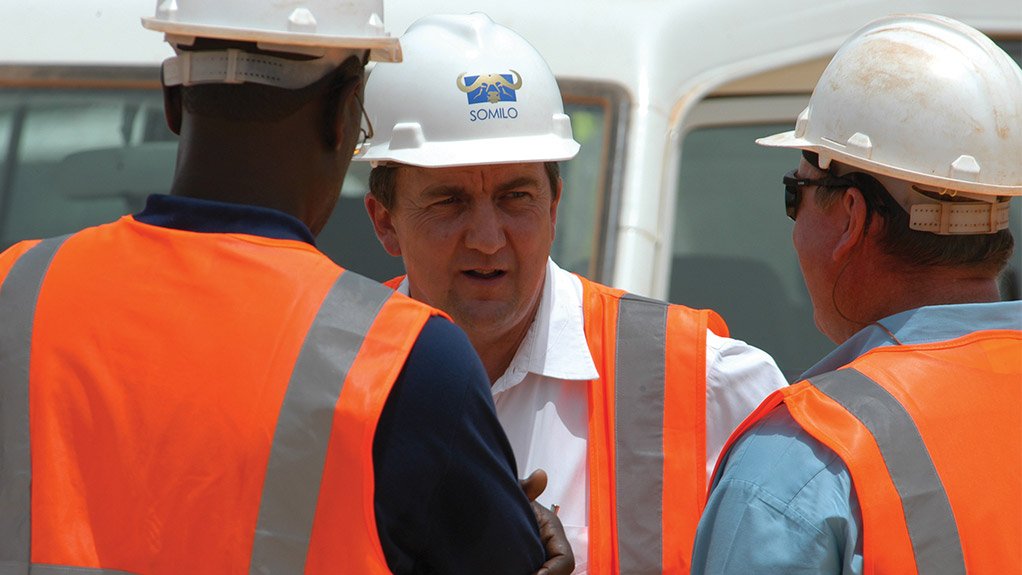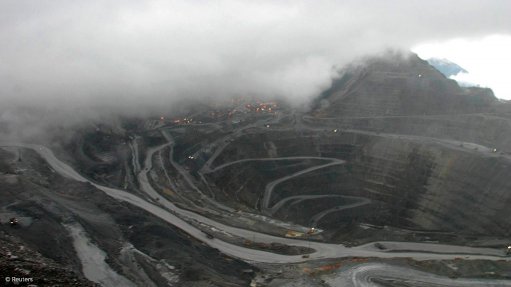Randgold chooses Côte d'Ivoire for biggest-ever exploration drive
JOHANNESBURG (miningweekly.com) – Gold mining company Randgold Resources, which once again upped its free cash in the three months to September 30, announced on Thursday that the highly prospective Côte d'Ivoire had been chosen for its biggest-ever exploration drive.
The debt-free London- and Nasdaq-listed company, which set a new third-quarter gold production record of 305 288 oz on exceptional performance at Kibali, in the Democratic Republic of Congo, and Morila, in Mali, is sufficiently funded to enable it to continue on its lucrative path of discovery and development, which it firmly believes creates the greatest shareholder value.
Twenty-year-old Randgold will be making use of new high-resolution, helicopter-deployed electromagnetic versatile time-domain electromagnetic (VTEM) technology, as well as magnetics and radiometrics surveying, in order to provide a complete spectrum of geophysical data.
“As an investment destination, Côte d'Ivoire is by far the best of our portfolio,” Randgold CEO Dr Mark Bristow told Creamer Media’s Mining Weekly Online after reporting third-quarter gold sales of $340.7-million on total cash costs of $212.3-million.
The major exploration drive follows Ivorian President Alassane Ouattara being sworn in for another five-year term after a “very constructive and peaceful election”.
The cost-containing and unimpaired company grew its cash by $59-million in the third quarter to give it $168-million in the bank.
“The best thing gold companies can do is ensure that they continue to generate free cash, as Randgold ably demonstrates,” Investec Securities commented in a note on the company’s third-quarter performance.
Profits from the big gold mining majors have become a rarity, even after substantial impairments.
Kibali, which is way ahead of its guidance, is forecasting a big step up in underground in the fourth-quarter after increasing throughput by 170 000 t this quarter, and since Sunday, Randgold’s Loulo underground mine in Mali has been doing its own highly mechanised self-mining under Malian management.
“We’ve gone in with cutting edge technology and we’ve trained the host country nationals to be highly skilled engineers.
“When we took over from the Australian contractors on Sunday, it was a sudden death change, and I’m very proud to show that we don’t only invest in exploration, but we invest in people,” Bristow commented to Creamer Media’s Mining Weekly Online.
On the exploration front, Randgold has obtained exceptional results out of Sophia in Senegal, which could make Massawa the company’s next big mining project.
Three boreholes in a 650 m zone averaged 30 m at 4.7 g and its free-milling ore points to lower-cost and higher-yield processing potential.
This has the potential to be a game changer but more holes must be drilled during the field season out to next June.
Meanwhile, replacement drilling at Gara has provided four more years of visibility, which means that Randgold is a business that can “easily go on for ten years at a gold price of $1 000/oz”.
There is little doubt that the company’s toughest current challenge is its opportunity at the Obuasi gold mine, in Ghana, which AngloGold Ashanti has put on its plate.
Randgold announced in September that it had concluded an investment agreement with AngloGold Ashanti aimed at the formation of a joint venture to redevelop and operate Obuasi. In terms of the agreement, Randgold is leading and funding a development plan study on rebuilding Obuasi as a viable long-life mining business with an attractive cost structure and appealing returns.
“As you see, we’re silent on Obuasi in the quarterly. It’s a tough call. It’s not something that I want to promise,” was Bristow’s response to Mining Weekly Online.
Obuasi has been a problem child for AngloGold Ashanti, which is why it is offering a free 50% earn-in to Randgold, which must come up with its plan to turn it to positive account by the end of January.
Bristow concedes that the Obuasi orebody is world class but because of the difficulty of arriving at a business case capable of carrying Obuasi’s liabilities, while still meeting tight investment criteria, his company remains at the stage of viewing it as “just another opportunity”.
On the socioeconomic front, Randgold has made agribusiness an integral part of its business.
Last week, it inaugurated a $2-million agricultural college in Mali, which aims to turn 100 students into farmers over three years.
The Loulo-Gounkoto agribusiness training centre provides a 12-month agricultural and entrepreneurial training programme on a five hectare farm, close to the mines, for students sponsored by their villages.
It is also developing agribusiness at its Morila, Tongon and Kibali mines.
“A mine is relatively short-lived but a successful farm is forever, and that is why we are focusing on an agricultural heritage for our operations,” said Bristow.
After completion of their 12-month course, groups of trainees will be set up as profit-sharing microenterprises and those successful will be equipped and funded to start there own ventures.
“Look at those early days in South Africa at how the economies grew from Welkom all the way through to the East Rand. Now with the mines gone, the economies are there.
“That’s still my concept. You’ve got to convert some of the value of the orebody into sustainable economies and the best place to start is agriculture,” Bristow commented to Mining Weekly Online.
Experts from Stellenbosch have run local economic development and entrepreneurial programmes, teaching local people how to create businesses and then make use of microfinance facilities around Randgold’s mines, which provide access to funding to entrepreneurs unable to obtain bank debt.
“It works so well and there’s no bad debt, it’s amazing. At Morila, we’ve cycled the fund 80% back into the fund and back out.”
Meanwhile, the 4 000 oz Domba project at Morila is expected to generate $10-million of cash in three months to guarantee Morila’s orderly closure.
Randgold boosting of production to a new record level in the third quarter was on the back of a steady all-round operational performance.
The Tongon mine, which has moved into a dividend-paying position after repaying its shareholder's loans of $448-million, has also paid close to $90-million to the Ivorian State in the form of royalties and taxes.
The government is in line to receive dividends through its 10% carried interest in the mine as well as the increased revenue when Tongon starts paying full corporate tax at the end of this year.
Since its commissioning five years ago, Tongon has also contributed more than $600-million to the economy of Côte d'Ivoire in the form of payments to local suppliers and has invested $6-million in community uplifitment.
Ongoing exploration around Tongon has increased its reserves ahead of the major VTEM-assisted exploration drive, which will include a fresh look at the Nielle permit, which hosts Tongon, where the workforce is 97% Ivorian.
Ouattara’s second and final term won 83.66% of the votes in the election, which was overseen by more than 5 000 observers who gave it the thumbs up.
The poll was the country’s first presidential race since a deadly bout of post-electoral violence between 2010 and 2011 led to the death of some 3 000 people, according to the UN.
Since 2011, Ouattara has been credited with steering the country through a period of economic growth following a brief civil war in 2011, sparked by former President Laurent Gbagbo’s refusal to accept the election result.
Tongon, which has received the President’s Award for the best operating mine for the second year running, produced 63 519 oz of gold in the third quarter, 16% higher than the previous quarter, primarily as a result of a 10% increase in tonnes processed.
Recovery continues to show an upward trend quarter-on-quarter with a further 1.8% improvement achieved as a result of further stabilisation of the new rougher flotation circuit.
Total cash cost an ounce decreased to $850/oz on the higher throughput, increased grade and better recovery.
Randgold intends using VTEM across its Boundiali and Makono permits.
Comments
Press Office
Announcements
What's On
Subscribe to improve your user experience...
Option 1 (equivalent of R125 a month):
Receive a weekly copy of Creamer Media's Engineering News & Mining Weekly magazine
(print copy for those in South Africa and e-magazine for those outside of South Africa)
Receive daily email newsletters
Access to full search results
Access archive of magazine back copies
Access to Projects in Progress
Access to ONE Research Report of your choice in PDF format
Option 2 (equivalent of R375 a month):
All benefits from Option 1
PLUS
Access to Creamer Media's Research Channel Africa for ALL Research Reports, in PDF format, on various industrial and mining sectors
including Electricity; Water; Energy Transition; Hydrogen; Roads, Rail and Ports; Coal; Gold; Platinum; Battery Metals; etc.
Already a subscriber?
Forgotten your password?
Receive weekly copy of Creamer Media's Engineering News & Mining Weekly magazine (print copy for those in South Africa and e-magazine for those outside of South Africa)
➕
Recieve daily email newsletters
➕
Access to full search results
➕
Access archive of magazine back copies
➕
Access to Projects in Progress
➕
Access to ONE Research Report of your choice in PDF format
RESEARCH CHANNEL AFRICA
R4500 (equivalent of R375 a month)
SUBSCRIBEAll benefits from Option 1
➕
Access to Creamer Media's Research Channel Africa for ALL Research Reports on various industrial and mining sectors, in PDF format, including on:
Electricity
➕
Water
➕
Energy Transition
➕
Hydrogen
➕
Roads, Rail and Ports
➕
Coal
➕
Gold
➕
Platinum
➕
Battery Metals
➕
etc.
Receive all benefits from Option 1 or Option 2 delivered to numerous people at your company
➕
Multiple User names and Passwords for simultaneous log-ins
➕
Intranet integration access to all in your organisation




















